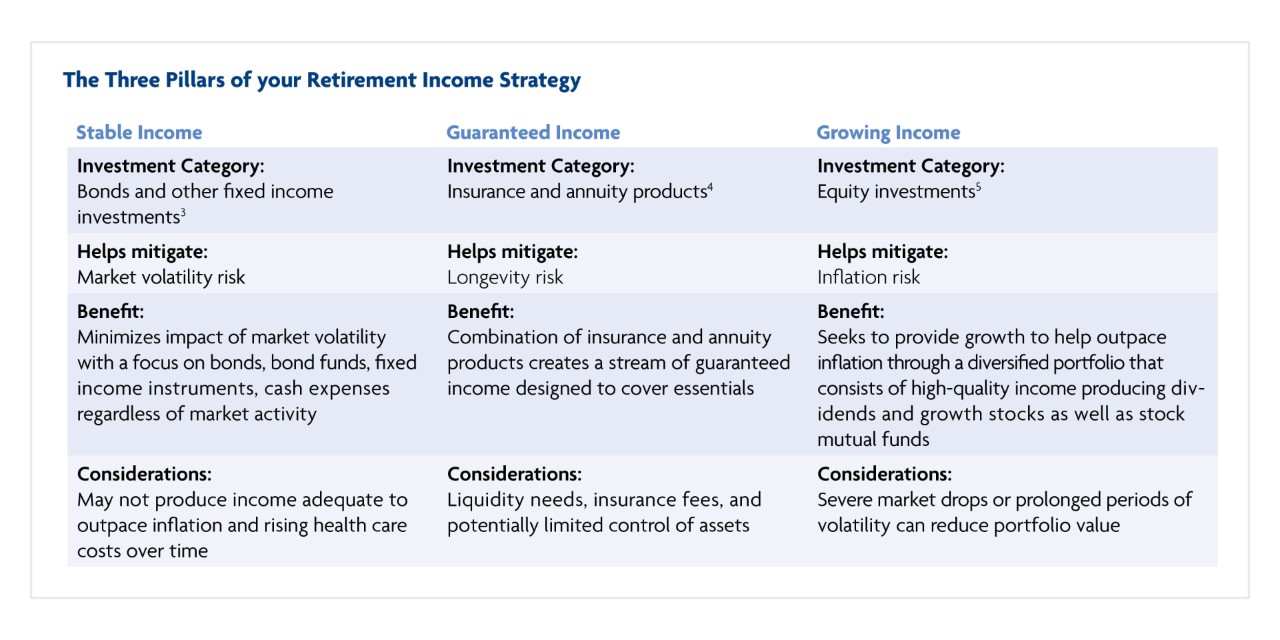Data tokens on this page
Financial Solutions
Financial Solutions
Maximizing Your Retirement Savings
A recent survey showed that 57% of Americans in the workforce feel behind on their retirement savings.1 Whether you are nearing retirement or already retired, putting a plan in place to help ensure you will have income throughout your life is critical.
You have spent a lifetime preparing for the next phase of your life when you can finally realize the goals and dreams you have worked so hard to achieve.
Successful retirement planning begins with understanding. Our financial professionals can help you develop a comprehensive retirement income strategy that addresses risk factors that will impact your retirement nest egg.
Key Retirement Risk Factors
With retirement comes a change in your financial management and your life. This is a time when living without employment means that your income will come from various retirement sources such as savings, social security, and pensions. It is important to have a plan that takes into account certain risks which may threaten your retirement security. The key is to acknowledge the risks to your retirement income and develop a plan that helps manage them.
Longevity and health care costs
Longevity is a critical factor impacting retirees today. While none of us can predict how long we will live, individuals at age 65 have a high probability of spending 20 years or more in retirement. Ensuring your assets last throughout retirement requires careful planning now to determine how inflation, rising health care costs, nursing home care, and other key factors may affect your income over time.
Inflation and rising costs
As life spans increase, many people will spend more time in retirement than they spend working. The longer your time in retirement, the greater the potential that inflation may erode your savings and impact your lifestyle. This makes it important for you and your financial professional to develop an income strategy to help outpace inflation.
Market volatility
Today’s financial markets have become increasingly volatile and complex, leaving many people wondering when they will be able to retire and how long their retirement assets will last. A sudden market downturn can have a significant impact to investors who are not well-diversified or those who do not have the time frame to wait out a market recovery.
Understanding Your Retirement Needs
For many years, you may have pursued an investment strategy emphasizing growth to help build retirement assets. However, once retired, your income needs probably outweigh your need to accumulate new assets. This makes it critical to re-evaluate your risk tolerance and preferences to help ensure both your investment strategy and spending plan are aligned with your retirement lifestyle needs and goals.
How long will your income last?
For most individuals, an essential part of retirement income planning is determining an appropriate withdrawal or spending strategy. What is the appropriate withdrawal rate for you—4%? 5%? 6%? By establishing a withdrawal rate that’s too high, you could potentially outlive your money. As the graphic to the right shows, the rate at which you withdraw from your retirement savings is a central factor in the sustainability of your retirement portfolio.
Finding the right balance
Ensuring you will have the income you need at and throughout retirement is a balancing act with savings on one side and your income needs and associated risks on the other.
Achieving the right balance to ensure your income needs are met throughout retirement requires a comprehensive retirement income plan and strategies that holistically address:
Risk factors that threaten to undermine your plans (longevity, inflation, market volatility, withdrawal rates)
Your personal goals and tolerance for risk
How you will protect and grow income in retirement
Priorities and trade-offs that may help you better manage your income needs and spending
Strategies to Help You Retire with Confidence
Working with you to develop your retirement income plan begins with mapping out specific strategies addressing your needs, concerns, and timeline. Our financial professionals will work with you to evaluate retirement income scenarios and potential trade-offs by using income modeling tools. Only then can a fully diversified retirement income strategy be designed that is compatible with your individual situation.
Once in retirement, the focus will likely be to include an allocation designed to meet specific income objectives, including asset protection, growth, and guaranteed income. To help meet these objectives, consider the three elements of a retirement income strategy:
Helping You Understand Your Needs
Our firm provides the tools, resources, and strategies to help you transition from asset accumulation to retirement income planning. From addressing risks and concerns to recommending tailored strategies, we provide the support you seek along your path in retirement. Talk to a Wintrust Wealth Management professional to help maximize your retirement savings.
1. Bankrate 2024 (https://www.bankrate.com/retirement/retirement-savings-survey/)
2. Projections generated by Morningstar regarding the likelihood of various investment outcomes are hypothetical in nature, do not reflect actual investment results, and are not guarantees of future results. Results may vary over time and with each simulation. This is for illustrative purposes only and not indicative of any investment.
3. Investing in fixed income securities involves certain risks such as market risk (if sold prior to maturity) and credit risk (especially if investing in high yield bonds, which have lower ratings and are subject to greater volatility). All fixed income investments may be worth less than original cost upon redemption or maturity.
4. Guarantees are based on the claims-paying ability of the issuing insurance company. Guarantees apply to minimum income from an annuity; they do not guarantee an investment return or the safety of the underlying funds. Variable annuities are long-term investments suitable for retirement funding and are subject to market fluctuations and investment risk.
5. Equity investments offer long-term growth potential, but may fluctuate more and provide less current income than other investments. An investment in the stock market should be made with an understanding of the risks associated with common stocks, including market fluctuations. Dividends are not guaranteed and are subject to change or elimination.
Start the Conversation
Where will your financial journey take you? A Financial Advisor helps you navigate the terrain, avoid pitfalls, and keep you on track to achieve your financial goals.


